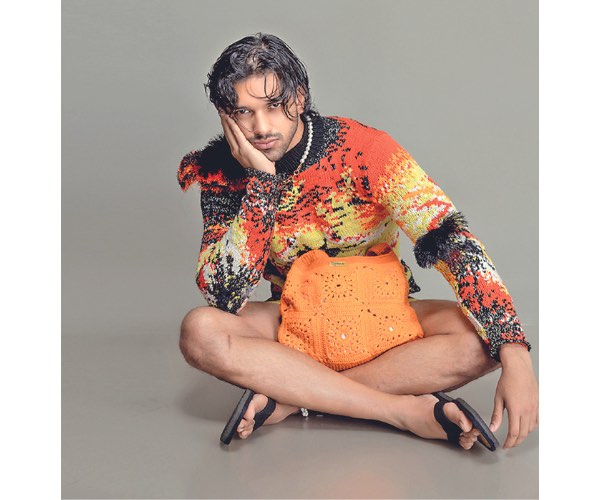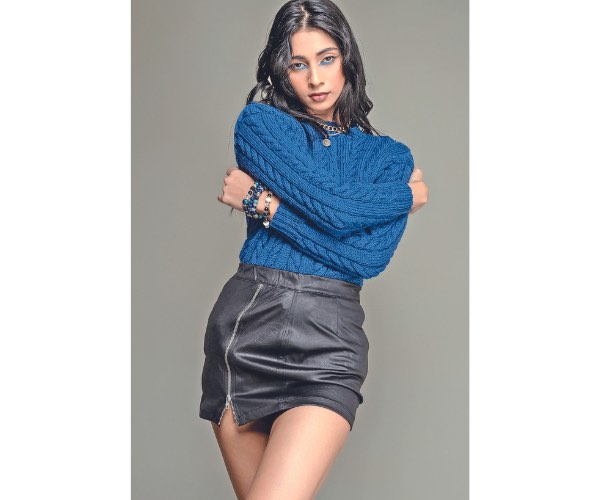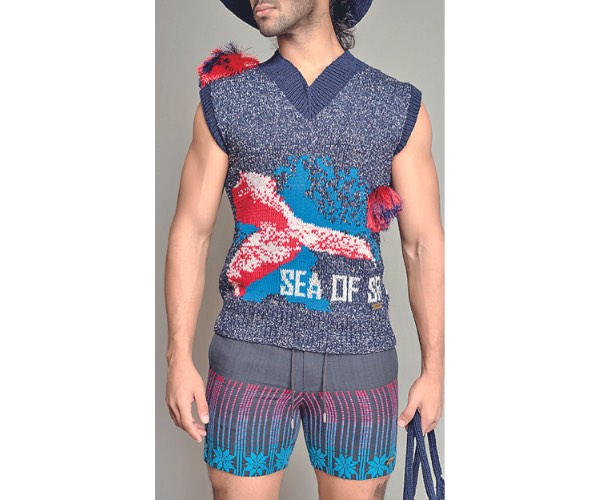
Mar 15 2024.
views 507




"Style is the way to say who you are without having to speak,” said Rachel Zoe, the well–known fashion designer. This is perhaps an apt definition of what fashion means to Lithira Daluwatte a Fashion Designer who says that fashion is his best form of expression. We had a chat with him about his work in the fashion industry.
Q WHAT MADE YOU BECOME INTERESTED IN FASHION AND TELL US HOW YOU BECAME A FASHION DESIGNER? From childhood, I was very interested in fashion and I have witnessed and admired the artisanal workshops around me. Consequently, my grandmother B. Manawadu who is a ‘ Beeralu ‘ artisan motivated me to pursue fashion design. I vividly remember watching my grandmother for hours on end weaving and entangling the cotton threads used in Beeralu to create awe-inspiring designs. In the evenings I would watch my grandmother along with her peers settle on the floor in a circle with their Beeralu beds designing intricate Beeralu laces. Her creations developed by tangling the threads from each bobbin were breathtaking and comprised different designs. My first proper understanding of fashion came from the late Mangala Samaraweera’s new paper clippings and fashion collections. I am an admirer of his work and his designs inspired me to be a fashion designer. Whilst researching I came across Ena De Silva, Barbara Sansoni and Chandramani Thenuwara, and these individuals and their work further inspired me. Consequently, I was able to launch a brand of my own and work for a renowned fashion company in Sri Lanka.
Q ARE THERE ANY PARTICULAR TYPES OF FASHION THAT YOU CONCENTRATE ON? Fashion and Textile development is what I predominantly focus on from the broad range of categories under fashion design. I constantly engage in designing authentic and novel creations alongside native crafts communities and textile industries. Furthermore, it is common to see a range of authentic and native textile developments in my designs and collections whilst I am also keen on designing ‘wearable’ art pieces. Prior to designing my collections, I tend to spend numerous hours, days and months engaging in conversation with these craftsmen and observing the artisanal process. This is one of my favourite phases of the design process.
Q WHAT IS YOUR DEFINITION OF FASHION? Fashion is simply my best form of expression. My designs tend to reflect the feelings, thoughts and concepts I dwell on during said periods of time including happiness, excitement, sorrow and anger. I tend to sketch my thoughts, experiences and feelings in a sketchbook that I then transform into designs. I communicate stories in my collections by including motifs, lines, hues and varying shapes. My design process is a fusion of the stories built in my mind backed by research and ongoing issues in the world.
Q HAVE YOU DONE ANY STUDIES IN FASHION DESIGN? IF SO TELL US ABOUT IT AND HOW IT HAS CONTRIBUTED TOWARDS THE BETTERMENT OF YOUR WORK. I pursued my studies in Fashion Design once I completed my ALs and am currently a graduate of NIBM Limkokwing University. Although my interest has been in design since I was a child, my university experience was crucial in polishing my skills in design. I was able to encounter various celebrities models and fashion experts at my university which piqued my interest in working with them. My university lecturers offered invaluable insight in regards to Fashion Design and I must mention Udaya Wickramasingha who provided much guidance during my college years.
Q TELL US ABOUT THE LAUNCH OF YOUR BRAND AND HOW SUCCESSFUL IT HAS BEEN. My brand is known as LITHIRA and is a high-end designer wear brand which has been one of my childhood dreams. LITHIRA is a vibrant and bold designer-wear brand that focuses on offering innovative, creative, handcrafted and high-quality designs. LITHIRA caters to conscious consumers who place emphasis on sustainability, fair trade and ethics. LITHIRA hopes to preserve the knowledge present in the crafts community and communicate it in a new approach to the world. Our garments are not merely products but the stories and knowledge of these craftsmen woven into each piece.
Q YOU ALSO MENTIONED THAT YOU ARE AN ARTIST – TELL US ABOUT THIS EXPERIENCE. IS THERE A PARTICULAR TYPE OF ART THAT YOU CONCENTRATE ON? I have always had an interest in art and it eventually grew and developed. I was keen on exploring how art transitioned and transformed according to varying time periods and cultures and how it embodied different identities in different nations. I explored various techniques from which watercolours and portraits stood out.
Q YOU MENTIONED THAT FOR YOUR GRADUATION COLLECTION YOU ARE TRYING TO COMBINE TOURISM WITH THE LOCAL CRAFT COMMUNITY IN THE SOUTH – HOW DO YOU PLAN TO GO ABOUT DOING THIS? A key factor of my collection was communicating a fusion between two key concepts which are local craftsmanship and tourism. My goal was to explore the widespread authentic craftsmanship and Sri Lankan textiles on the south coast of Sri Lanka and to present it to an international market. Sustainability was also a key objective of this collection and was maintained throughout the project. The promotion of social, economic, cultural and environmental factors was vital in my collection. The collection was solely inspired by the beautiful and awe-inspiring coast in the south of Sri Lanka.
Q FINALLY TELL US WHAT YOUR FUTURE PLANS ARE ESPECIALLY WITH REGARD TO THE FASHION INDUSTRY, YOUR INTEREST IN ART AND ANYTHING ELSE THAT INSPIRES YOU. So far, my projects are focused and based on researching textiles and crafts such as knitting, crocheting and weaving. However, I am planning to expand my research into other local crafts and textile industries in Sri Lanka. I would also expect to broaden this research area and do experiments to explore more new textile ideas while developing my creativity.
Text Kshalini Nonis
Pix courtesy - LITHIRA
0 Comments